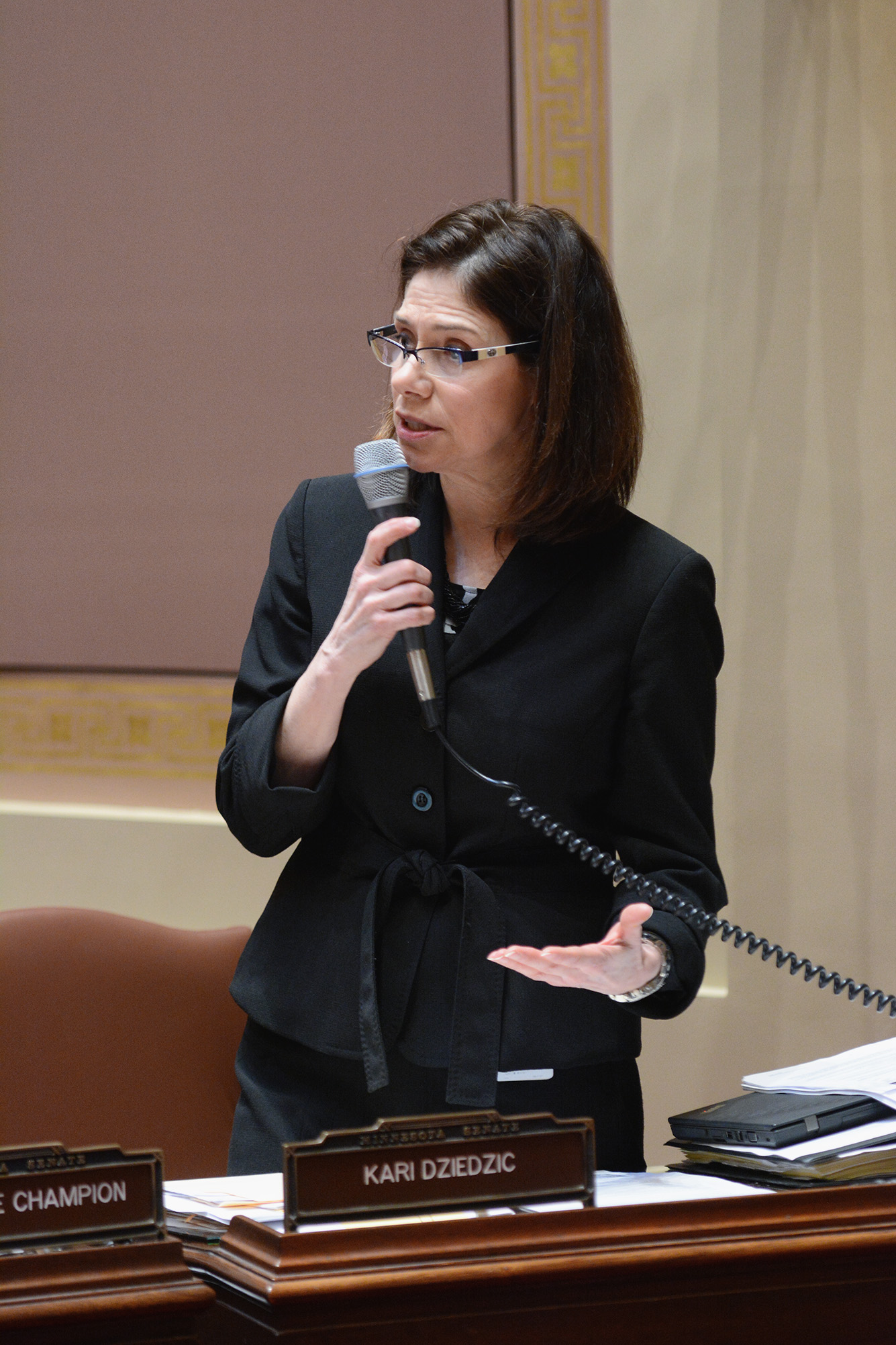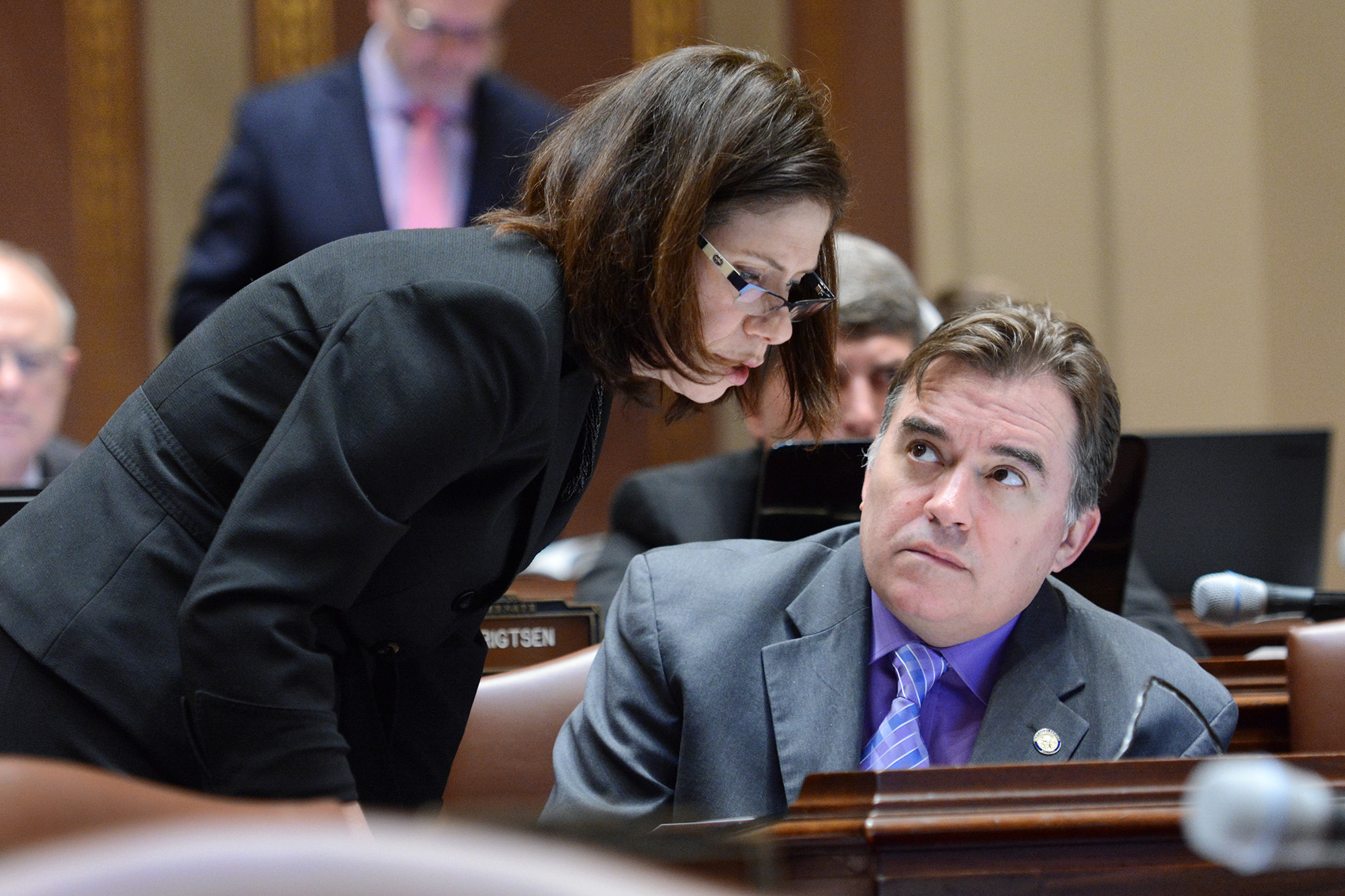|
Dear
Friends
and
Neighbors,
This
year’s
Session
went
into
overtime,
as
all
the
budgets
had
not
been
finished
by
the
last
day
of
Session.
While
many
budget
numbers
had
been
agreed
to,
the
details
behind
those
numbers
including
some
House
policy
provisions
did
not
have
agreement.
When
an
agreement
is
reached,
the
bills
take
hours
to
draft,
process,
and
read.
There
were
many
changes
at
the
Capitol.
First
the
newly
restored
Capitol
building
reopened.
In
2013,
my
office
was
in
room
317
on
the
East
side
of
the
Capitol.
I
had
a
great
view
of
the
Cathedral
but
access
was
limited
to
two
slow
elevators
and
a
small
back
staircase.
On
more
than
one
occasion,
it
was
raining
inside
the
building
when
I
got
off
the
elevator.
That
space
is
now
a
gathering
/
meeting
space
with
a
beautiful
skylight!
With
the
restoration,
there
is
nearly
40,000
square
feet
of
new
or
restored
public
space
in
the
Capitol,
with
new
meeting
rooms,
gallery
space,
and
expanded
dining
space
for
visitors
to
use.
I
encourage
you
to
visit
St.
Paul
and
take
a
tour
of
it,
it
is
beautiful.
Tour
information
can
be
found
at
www.mnhs.org/capitol.
Watch
for
more
information
about
the
Grand
Reopening
happening
August
11-13.
The
next
big
change
was
losing
the
majority
in
the
Senate.
The
Senate
Republicans
won
a
1
seat
majority
in
the
November
election.
My
first
Session
at
the
legislature
was
in
the
minority.
Being
in
the
minority
seems
to
be
more
about
defense,
rather
than
offense.
When
we
were
in
the
majority
the
last
four
years,
I
worked
to
advance
a
progressive
agenda,
this
year
I
spent
a
lot
of
time
and
energy
to
stop
regressive
policies
-
many
targeted
at
Minneapolis.
The
Session
started
off
hot
when
Republicans
began
introducing
bills
that
aimed
to
take
away
the
first
amendment
rights
of
protestors,
prevent
undocumented
immigrants
from
getting
licenses,
eliminate
environmental
protections,
and
preempt
local
governments
from
enacting
their
own
policies
and
ordinances.
I
am
grateful
for
all
your
calls
and
emails
explaining
your
positions
on
these
bills.
Your
advocacy
and
presence
at
the
Capitol
–
especially
at
the
end
of
session
-
helped
us
defeat
some
of
these
provisions,
but
unfortunately
being
the
minority
hindered
our
success.
 While
it
was
more
difficult
to
get
bills
passed,
I
am
still
proud
of
some
of
the
work
we
did
this
year.
I
authored
approximately
65
bills,
and
around
20
of
them
became
law.
Some
of
them
were
issues
that
will
help
counties
deal
with
tax
forfeited
land
and
one
ensures
continuing
review
of
hydro
power
plans
on
the
Mississippi.
I
also
had
the
pleasure
of
being
the
DFL
lead
on
the
Agriculture,
Rural
Development,
and
Housing
Finance
Committee.
While
Senate
District
60
could
hardly
be
considered
rural
and
does
not
have
a
lot
of
big
Ag,
we
discussed
a
lot
of
policies
that
affect
every
corner
of
our
state
–
notably
the
shortage
of
affordable
housing.
I
was
also
on
the
Environment
and
Natural
Resources
Finance
Committee
and
the
Tax
Committee. While
it
was
more
difficult
to
get
bills
passed,
I
am
still
proud
of
some
of
the
work
we
did
this
year.
I
authored
approximately
65
bills,
and
around
20
of
them
became
law.
Some
of
them
were
issues
that
will
help
counties
deal
with
tax
forfeited
land
and
one
ensures
continuing
review
of
hydro
power
plans
on
the
Mississippi.
I
also
had
the
pleasure
of
being
the
DFL
lead
on
the
Agriculture,
Rural
Development,
and
Housing
Finance
Committee.
While
Senate
District
60
could
hardly
be
considered
rural
and
does
not
have
a
lot
of
big
Ag,
we
discussed
a
lot
of
policies
that
affect
every
corner
of
our
state
–
notably
the
shortage
of
affordable
housing.
I
was
also
on
the
Environment
and
Natural
Resources
Finance
Committee
and
the
Tax
Committee.
At
the
start
of
this
Session
we
had
a
projected
$1.2
billion
dollar
surplus
and
a
nationally
recognized
budget
reserve
that
helped
restore
our
AAA
Bond
Rating.
However,
after
this
year’s
tax
and
spending
bills,
the
financial
stability
of
our
state
could
be
at
risk.
There
are
some
good
provisions
in
the
Budget
Bills
and
tax
relief
for
some
seniors,
college
students,
and
small
business
in
the
Tax
Bill.
However
there
are
concerns,
the
size
of
the
$658
million
tax
bill
grows
substantially
in
the
future
years,
and
many
programs
that
have
continuing
costs
were
funded
with
one-time
money.
When
I
started
at
the
legislature
in
2012
we
had
a
deficit,
and
I
hope
we
do
not
return
to
those
days
in
the
near
future.
The
Governor
signed
all
the
Budget
Bills
and
the
Tax
Bill.
I
voted
for
the
Agriculture
Budget
but
did
not
vote
for
any
of
the
other
Budget
Bills
or
the
Tax
Bill.
The
Budget
Bills
contained
some
good
provisions
but
also
some
troublesome
provisions.
We
strive
to
be
transparent
and
have
an
open
process
that
allows
public
input
on
bills
during
committee
meetings
and
conference
committees
meetings.
In
the
past
few
years,
I
have
been
on
or
at
Conference
Committee
meetings
with
a
room
full
of
people
testifying
on
the
issues.
Unfortunately
there
was
not
a
lot
of
public
testimony
taken
during
Conference
Committees
this
year.
We
voted
on
some
of
the
bills
in
the
middle
of
the
night.
The
Republicans
put
a
line
in
the
100
page
State
Departments
Budget
Bill
stating
the
Revenue
Department
budget
was
effective
when
the
Tax
Bill
was
enacted.
The
Governor
was
not
aware
and
did
not
agree
to
this
language
–
and
was
not
happy
about
it.
He
had
reservations
about
the
size
of
the
Tax
Bill
but
did
not
want
to
shut
down
the
Revenue
Department
by
vetoing
the
Tax
Bill
so
he
line
item
vetoed
the
Legislature’s
Budget
in
the
State
Departments
Budget
Bill
to
bring
us
back
to
the
table
to
discuss
some
provisions. .jpg)
Without
a
budget
appropriation,
the
Senate’s
funding
could
run
out
by
September.
The
Republican
majorities
decided
to
sue
the
Governor
in
Court
over
the
issue.
I’ve
heard
constitutional
experts
discuss
whether
both
the
Revenue
Department
funding
tied
to
the
Tax
Bill
and
the
Legislature
funding
veto
violated
separation
of
powers.
The
Governor
sent
the
legislative
leaders
a
letter
requesting
they
meet
to
resolve
the
situation.
We
may
have
another
Special
Session
–
stay
tuned!
Below
is
a
short
summary
of
some
of
the
bills.
I
will
provide
additional
information
and
more
detail
on
some
of
the
larger
bills,
especially
their
local
impacts,
in
the
coming
weeks.
It
is
an
honor
and
privilege
to
serve
you
as
your
state
senator.
I
appreciate
working
with
you
on
many
issues
and
projects
to
improve
our
neighborhoods.
Thank
you
for
your
phone
calls,
emails,
letters,
and
advocacy
at
the
Capitol
–
it
helps
me
represent
you.
I
will
not
be
in
the
office
everyday
but
you
can
still
reach
me,
or
my
assistant
Beth
Johnston,
at
651-296-7809
or
via
email
if
we
can
help
you
in
any
way.
Have
a
safe
and
enjoyable
summer!
--Kari
Dziedzic
|